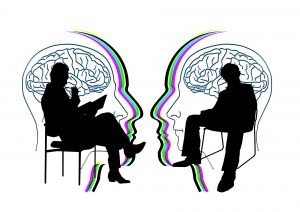7 Benefits of Studying Psychology

Though it may not seem obvious at first, psychology can be applied to your everyday life. It can be used when trying to problem-solve, when dealing with difficult people and/or situations, or even when you are trying to de-stress. Here are some of the valuable benefits to diving into psychology:
1. Improves your communication skills.
This may sound odd, but learning how other people think can help you better adjust to conversations with people you work with or significant others or friends and family. Just like everyone has a love language, everyone also has a very particular way they communicate. You become a more powerful speaker because you learn how to effectively get your point across without creating potentially false assumptions or misunderstandings.
2. Ability to handle stress.

Understanding how the mind works leads to insight on how to cope with everyday stress. Whether it is insight to your mind or someone else’s, you begin to see stress triggers and learn to avoid them or decrease their occurrence. If these triggers are unavoidable, at that point you can make a proactive choice on learning to cope with the stress (watching a movie, reading a good book, take up a hobby, etc) after the fact.
3. Lay the groundwork for other careers.
One thing you not usually taught in school is how psychology fits into various work fields. For example, by studying psychology you could go into teaching, counseling, writing (of course!), human resources, research, and so on. Unless you plan on getting a master or doctorate, you can easily put a bachelor in psychology to use in other workforce areas. Having a foundation of human behavior opens the doors and provides the skill set necessary for various job opportunities.
4. Behavioral training skills.
Psychology provides the tools to become a behavioral trainer, which can prove useful for pets, children, and even significant others. Two of the commonly known tools are conditioning and reinforcement, but further study also gives way to understanding why people are afraid of heights or why their hearts race with loud sounds. These are tips in the right direction of what would be the best training method to exercise.
5. Understanding you.
A lot of you go through life’s game of trial and error to find out what you do and do not like. Psychology not only helps you understand the thought processes of others, but also yours! Your thought patterns are unique, and only you have the key to really decipher them. Imagine having a connect-the-dot, each dot being a point of reference. What if you could avoid constant trial and error by following that train of thought? With a little work and practice at self reflection, it can be possible. You learn how your mind strings together thoughts, leading you to an analysis of simplistic good and/or bad situations, decisions, and wants.

6. Enhanced memory abilities.
One thing you learn through psychology is the process of acquiring and using memory. Most curriculum have at least one course where you gain a foundation of neurological bases of memory and how to consolidate and retrieve memory. One example would be the way we memorize or learn a phone number. We know the first three digits to be an area code and the next seven are the line directly to point of contact. In order to make it easier, the brain breaks it down into chunks of three and four. It works similarly to computers breaking down data into bits and bytes. The information becomes easier to digest, which in turn makes it easier to access down the line as needed. There are various apps and games that help your memory with this concept in mind.
7. An opportunity to help another.
With all other points in mind, diving into psychology can also give you the ability to help others. You can provide counseling or pep talks to make a difference in a person’s life. Often times people struggling with things like anxiety, depression, substance abuse, adjusting to work/school/life changes, marital problems, grief, etc., need a helping hand, which you can then provide with your skills from studying psychology.
These are just a few of the benefits you will find walking through the many doors of psychology. Over time (and practice) you discover in what ways it helps you best. You will find out how to best use the tools. Admittedly there are plenty of articles and data to consume when it comes to the vastness of the mind, but with a little search you can find what piques your interest. You can then embrace the knowledge without reservations and use it!



Responses